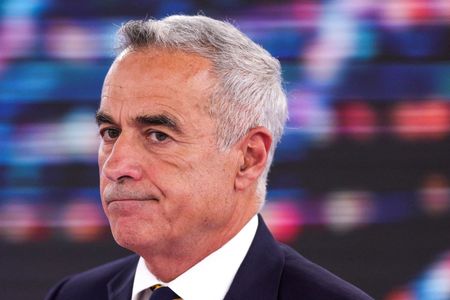By Luiza Ilie, Lili Bayer, Andrew Gray
BUCHAREST/BRUSSELS (Reuters) -Calin Georgescu, whose stunning victory in the first round of Romania’s presidential election was declared void on Friday, is a hard-right, self-styled outsider critical of NATO who wants to end his country’s support for its neighbour Ukraine.
Romania’s top court annulled the results of the Nov. 24 vote after declassified security documents said Romania had been a target of “aggressive hybrid Russian attacks” during the election period.
The court ruled the whole process must be rerun.
Georgescu was polling in the single digits in October but surged to a surprise victory with just shy of 23% of the first round votes.
Had he gone on to win the final second round, scheduled for Sunday, he would have headed the country’s armed forces, chaired the supreme defence council that decides on military aid, and had the power to appoint the prime minister, chief judges, prosecutors and secret service heads.
He would have also shared control of defence spending with the government and represented Romania at NATO and EU summits.
One of the biggest shifts would have been his challenge to Romania’s longstanding pro-Ukraine position, and his promise to switch to engaging with rather than challenging, Russia.
Speaking to Reuters this week – before the vote was voided – he said he was planning to stop Ukrainian grain exports through Romania and bar further military aid to Kyiv. He also said Bucharest was not obliged to stick to NATO’s defence spending commitments.
“How could I agree to that? It is impossible. Romania and the Romanian people come first,” Georgescu said.
“It is unimaginable that there be a war next to us in the middle of Europe, so a priority will definitely be that this war in Ukraine must immediately be stopped.”
Georgescu said it was his country that interested him most.
“Anything else is secondary,” Georgescu told Reuters. “Everybody … is asking me about Ukraine, this whole campaign has been tied to Ukraine. It is not essential.”
Romania has been a strong supporter of Ukraine, enabling the export of 30 million tons of grain through its Black Sea port of Constanta, training Ukrainian fighter pilots and donating a Patriot air defence battery.
“Romania is an absolutely key player in terms of security and defence in Europe and for the support of Ukraine,” Oana Lungescu, a Romanian-born former NATO spokesperson and now a fellow at the Royal United Services Institute think tank, told Reuters after the first round of voting wrapped up.
“Anything, any policy and any political actor that changes that risks having not just a major impact on Romania itself, on the course of Romania’s security and democracy, but also for the security of Europe and of the Euro-Atlantic area,” she said.
A senior EU diplomat told Reuters after the election’s first round it would be a “disaster” for the EU if Georgescu won the presidency, noting Romania’s shared border with Ukraine and the fact it was one of the European bloc’s larger countries.
‘MARTYRS’
Also of concern to European allies is Georgescu describing as national heroes and “martyrs” Ion Antonescu, Romania’s de facto World War Two leader, sentenced to death for his part in Romania’s Holocaust, and Corneliu Zelea Codreanu, a pre-World War Two leader of the Iron Guard, one of Europe’s most violent anti-Semitic movements.
The EU diplomat said Georgescu’s views on the pair, as well as on NATO, would increase tensions both at home and abroad if he came to power.
“Imagine the discussions in the (European) Council, imagine the polarisation he would bring at home,” said the EU diplomat.
Akin to the election campaign of U.S. President-elect Donald Trump, Georgescu ran a campaign as an independent insurgent not beholden to centrist, incumbent parties that have had to struggle with inflation.
Inflation was down to 4.7% in October, compared with an annual rate of 13.8% in 2022, but it still remains the highest in central and eastern Europe.
The themes of Georgescu’s campaign on TikTok and YouTube focused on the importance of family values, tradition, the Christian Orthodox Church and connection to the earth.
Other videos emphasise his sporting abilities: the 62-year-old is a black belt in judo and he runs marathons.
But he was not always an outsider: he has held various government jobs at home, including as a senior civil servant in the ministries of environment and foreign affairs, while abroad, he has worked as a United Nations special rapporteur on the impact of toxic waste on human rights.
He was also a member of a political party: the hard-right opposition Alliance for Uniting Romanians (AUR), which once touted him as their choice for prime minister.
But he left AUR in 2022 after senior party members said his pro-Russian, anti-NATO stance damaged the party’s image.
In a 2021 interview, he called NATO’s ballistic missile defence shield located in the Romanian town of Deveselu a “shame of diplomacy” and said the North Atlantic alliance will not protect any of its members should they be attacked by Russia.
(Reporting by Luiza Ilie in Bucharest, Lily Bayer and Andrew Gray in Brussels, writing by Gwladys Fouche, Editing by William Maclean and Andrew Heavens)
